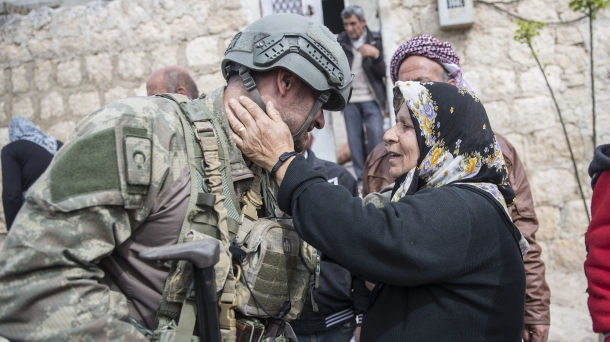
The recent advances of the Turkish military “Olive Branch” operation in Afrin and the possible scenarios of the Turkish-US and Turkish-Russian agreements indicate the operation is most likely to continue and play a major role in future negotiations over Syria. Turkey’s recent announcement that the Free Syrian Army and Turkish troops have taken control of the centre of Afrin, the target of an offensive against the Syrian Kurdish Democratic Union Party (PYP), has proved to be a major achievement for the Turkish operation launched in January 2018.
Turkey has faced the complex political challenges of the Syrian crisis and the rumours disseminated by the Syrian regime, the Kurdish media, and the West. Still, it has defeated both allegations of ‘inefficiency’ of its army and ‘siding’ with Assad’s regime, as well as the major political complexities in Syria after the Turkish army bombed the pro-Syrian Shiite militias along with the Kurdish rebels in Afrin.
In contrast to their Operation Euphrates Shield (2016-17), Olive Branch operation, which would not have been successful without the Russian assistance and reassurance that the Syrian regime would not strike back, has achieved its goals in a much shorter time than expected, taking over the city without harming the facilities or residents, and with minimal loss at the Turkish side.
The Turkish-Russian-Iranian consensus, which emerged amid the failed coup in Turkey in 2016, had led to a mutual recognition, between Russia and Turkey, of the strategic bilateral interests inside Syria. Turkey is reportedly planning to encourage the same economic growth in Afrin as it did in other areas in Syria. However, the intentions of the Syrian regime and its Iranian allies are not clear; at least in the short and medium term. It is unlikely that the Iranian regime or militia forces will seek to clash with the Turkish forces. Such an option would certainly lead to a defeat. However, if Assad decides that there is no escape from trying to put an end to the Turkish influence in northern Syria, he may seek to reach an agreement with the Democratic Union Party and the People's Protection Forces and encourage them to engage in quasi-guerrilla warfare in the Turkish-controlled areas. This option, of course, will put the Kurdish militants in direct confrontation not only with the Turkish forces, but also with the Turkish-backed Free Syrian Army.
The United States has no military activity in Afrin; neither the region is among the targeted areas of the US presence in Syria. But, Washington is still relies on the Kurdish People's Protection Units in the fight against ISIS, and in preventing Iran from securing a safe passage through northern Iraq and eastern Syria to the Mediterranean. The U.S. Pentagon has considered the Turkish intervention in Afrin as a weakening of the People's Protection Units and a crackdown on the efforts of combating ISIS.
Washington did not explicitly oppose the Turkish move, since Ankara had not notified it in advance about the launch of the operation. However, American spokespersons did not hesitate to question the objectives of the operation and expressed sympathy with the Kurdish militants. When the Security Council passed a new resolution that called for a cease-fire in Syria in the context of the Syrian regime's brutal attacks in Ghouta, U.S. officials interpreted the resolution to be applicable to Turkish operations in Afrin as well.
With the exception of small enclaves in the northwest of Afrin, the Turkish Army and the Free Syrian Army are expected to control the region swiftly. Such a move would bring Olive Branch closer to fulfilling its objectives. Turkey seeks to secure its strategic interests, including the prevention of the emergence of an armed Kurdish entity and the linkage of the Syrian cities of Jarabulus, Al-Bab, and Afrin to Turkey in terms of security, services and economy. This ambition can be jeopardised by Russia’s interest in widening the gap between Turkey and its allies in Washington. However, If Turkey succeeds in mending the differences reaching an agreement with Washington over Manbij, the entire Syrian region in the north of the Euphrates will fall under the Turkish influence, not far away from the city of Aleppo.
As it considers the Kurdish military a reliable ally against ISIS and seeks to prevent Iran from reaching the Mediterranean through Iraq and Syria, the current U.S. policy sees the operation in Afrin as a venture that may undermine an important ally.
Olive Branch may help secure a Turkey's foothold in the neighbouring country and a bigger role in future negotiations over Syria. However, the trajectory of Olive Branch and Euphrates Shield operations are not clear.
*This is a summary of a policy brief written in Arabic published on AJCS’s Arabic website. It is available here: http://studies.aljazeera.net/ar/positionestimate/2018/03/180320135137273.html.